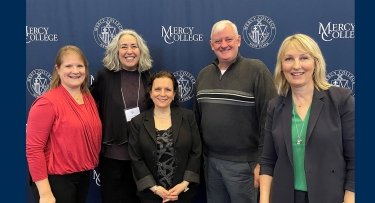Mercy College Faculty Advance Their Knowledge and Practice on Faculty Seminar Day

From left to right: Nanette Hyland, associate professor; Eva Fernandez, provost and vice president of academic affairs; Karen Singer-Freeman, director of Research at the Center for the Advancement of Teaching Wake Forest University; Matthew Hyland, faculty senate leader and associate professor; Juli Charkes, director for the Center of Teaching and Learning
At the March 8 Mercy College Spring Faculty Seminar Day, faculty from Mercy’s schools gathered to deepen their knowledge of innovations in teaching, learning and scholarship, and ultimately enhance their abilities to support Mercy’s diverse student body in achieving their educational goals.
More than 300 Mercy faculty joined the bi-annual seminar, which was organized by the Mercy College Center for Teaching and Learning (CTL) in partnership with the Office of the Provost, the deans of Mercy’s schools, faculty and members of the Teaching and Learning Advisory Committee.
The seminar included remarks by Mercy College President Tim Hall, Provost and Vice President of Academic Affairs Eva Fernández, Faculty Senate President Matthew Hyland and Juli Charkes, director of CTL. There was a keynote presentation by Dr. Karen Singer-Freeman, director of Research at the Center for the Advancement of Teaching at Wake Forest University, as well as several breakout sessions on issues impacting the higher education landscape facilitated by Mercy College faculty and staff.
“Mercy is committed to providing faculty with opportunities to improve their pedagogical practices in order to maximize student success and further strengthen equitable learning across the College,” Fernández said. “Faculty Seminar Day is one of the ways in which Mercy fulfills this commitment, as a forum that encourages the cultivation of new ideas, collaboration, and sharing of best practices among our expert faculty.”
During the seminar, faculty and speakers presented advances in neuroscience and cognitive and behavioral sciences that can help instructors best meet the learning needs of their diverse students. “We are living in a golden moment of teaching and learning in which we understand in new and important ways how learning takes place and how teaching can be most successful,” Charkes explained.
For example, during Singer-Freeman’s presentation, faculty learned actionable strategies for successful teaching of diverse students. Titled “Equity Driven Assessment: Simple Steps to Creating Inclusive Assignments,” Singer-Freeman presented approaches to increase the diversity of students who succeed, feed students’ sense of belonging and enhance their broad sense of academic efficacy.
According to Charkes, the process of determining a program for Faculty Seminar Day is done with enormous care and inclusivity. Over the course of the past academic year, CTL worked to understand the needs of Mercy faculty, as well as the opportunities for learning represented by thought leaders, experts and scholars in pedagogical theory and practice to shape a productive and impactful seminar.
To learn more about the Mercy College Center for Teaching and Learning, please click here.
